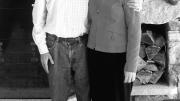After decades spent working at a corporate law firm in Manchester, New Hampshire, Jon Richardson ’65, LL.B. ’68, and his wife, Margaret, opened a small bookstore in York Harbor, Maine, in the 1980s to learn the used-book business. Two decades later, now retired—though busy all the same—they run York Harbor Books as a small bookseller and rare book dealership that specializes in the works of Virginia Woolf and the Bloomsbury Group.
Like many other booksellers, the Richardsons entered the business because of their longstanding love for the bookstores of others. They started York Harbor Books as generalists, but, as Richardson explains, “My wife got interested in Virginia Woolf, we started doing catalogs,” and now their store works extensively with materials pertaining not only to Woolf, but also to E.M. Forster, John Maynard Keynes, and other figures from one of the most celebrated groups of friends in literary history. Their collection includes postcards and letters exchanged by its members, first-edition British copies of To the Lighthouse and Orlando from the Hogarth Press, and a unique copy of Lytton Strachey’s Eminent Victorians hand-bound by Woolf herself.
Although bookselling is a notoriously challenging business, littered with the tattered remnants of many lost illusions, Richardson says that running York Harbor Books has actually proven to be a manageable and rewarding experience in retirement. “We were interested in it, but it was also economically feasible because there were customers,” he says. Any rare-book dealer must take years to find both interested sellers and prospective buyers, but specializing in the Bloomsbury Group, he explains, has been somewhat less fraught with problems than is the case for dealers in other authors and periods because Woolf and her companions are “still taught, still collected, and many of the people who study the group end up as collectors.”
The business also offers the benefit of working with a variety of people and institutions. “I try to go to England once a year to visit book dealers and other sources,” Richardson reports; the couple have also been involved with arrangements for exhibitions of Bloomsbury materials that travel to universities and libraries across the United States. “It’s been a happy confluence,” he reports. “The only surprising thing has been the strength of the interest”—which, he adds, does not seem likely to diminish—either for the Richardsons or for their customers—anytime soon.







